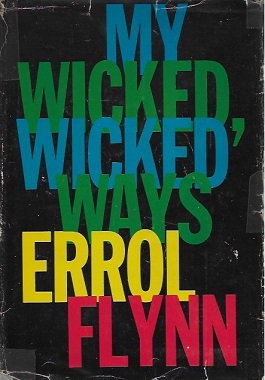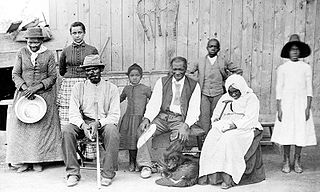
Harriet Tubman was an American abolitionist and social activist. Born into slavery, Tubman escaped and subsequently made some 13 missions to rescue approximately 70 slaves, including family and friends, using the network of antislavery activists and safe houses known as the Underground Railroad. During the American Civil War, she served as an armed scout and spy for the Union Army. In her later years, Tubman was an activist in the movement for women's suffrage.

Errol Leslie Thomson Flynn was an Australian-American actor who achieved worldwide fame during the Golden Age of Hollywood. He was known for his romantic swashbuckler roles, frequent partnerships with Olivia de Havilland, and reputation for his womanising and hedonistic personal life. His most notable roles include the eponymous hero in The Adventures of Robin Hood (1938), which was later named by the American Film Institute as the 18th greatest hero in American film history, the lead role in Captain Blood (1935), Major Geoffrey Vickers in The Charge of the Light Brigade (1936), and the hero in a number of Westerns such as Dodge City (1939), Santa Fe Trail (1940), and San Antonio (1945).

Auburn is a city in Cayuga County, New York, United States. Located at the north end of Owasco Lake, one of the Finger Lakes in Central New York, the city had a population of 26,866 at the 2020 census. It is the largest city of Cayuga County, the county seat, and the site of the maximum-security Auburn Correctional Facility, as well as the William H. Seward House Museum and the house of abolitionist Harriet Tubman.

The Scottsboro Boys were nine African American teenagers and young men, ages 13 to 20, accused in Alabama of raping two white women in 1931. The landmark set of legal cases from this incident dealt with racism and the right to a fair trial. The cases included a lynch mob before the suspects had been indicted, all-white juries, rushed trials, and disruptive mobs. It is commonly cited as an example of a legal injustice in the United States legal system.

Elizabeth Gurley Flynn was an American labor leader, activist, and feminist who played a leading role in the Industrial Workers of the World (IWW). Flynn was a founding member of the American Civil Liberties Union and a visible proponent of women's rights, birth control, and women's suffrage. She joined the Communist Party USA in 1936 and late in life, in 1961, became its chairwoman. She died during a visit to the Soviet Union, where she was accorded a state funeral with processions in Red Square attended by over 25,000 people.

The Cyrus Gates Farmstead is located in Maine, New York. Cyrus Gates was a cartographer and map maker for New York State, as well as an abolitionist. The great granddaughter of Cyrus-Louise Gates-Gunsalus has stated that from 1848 until the end of slavery in the United States in 1865, the Cyrus Gates Farmstead was a station or stop on the Underground Railroad. Its owners, Cyrus and Arabella Gates, were outspoken abolitionists as well as active and vital members of their community. Historian Shirley L. Woodward states that through those years escaped slaves came through the Gates' station.

Samuel Simon Leibowitz was a Romanian-American criminal defense attorney, famously noted for winning the vast majority of his cases, who later became a justice of the New York State Supreme Court.

Harry Haywood was an American political activist who was a leading figure in both the Communist Party of the United States (CPUSA) and the Communist Party of the Soviet Union (CPSU). His goal was to connect the political philosophy of the Communist Party with the issues of race.

Too Much, Too Soon is a 1958 biographical film about Diana Barrymore produced by Warner Bros. It was directed by Art Napoleon and produced by Henry Blanke from a screenplay by Art Napoleon and Jo Napoleon, based on the autobiography by Diana Barrymore and Gerold Frank. The music score was by Ernest Gold and the cinematography by both Nicholas Musuraca and Carl E. Guthrie. Diana died in 1960, two years after the release of this film.

Haywood Patterson was one of the Scottsboro Boys. He was accused of raping Victoria Price and Ruby Bates. He wrote a book about his experience, Scottsboro Boy.

Harriet Tubman Grave is an historic gravesite located in Fort Hill Cemetery at Auburn, in Cayuga County, New York. The granite gravestone marks the resting place of famed African-American abolitionist and Christian Harriet Tubman, who was born into slavery in Maryland in the United States in 1822.

My Wicked, Wicked Ways is an autobiography written by Australian-born American actor Errol Flynn with the aid of ghostwriter Earl Conrad. It was released posthumously in 1959 and became immensely popular for its cynical tone and candid depiction of the world of filmmaking in Hollywood. My Wicked, Wicked Ways has sold over one million copies. The book has never been out of print.
Milton C. Sernett is an American historian, author, and professor at Syracuse University. He has published many books, articles and book chapters on African American history. His published works in African-American history focus on abolitionism, religion, biographies and the Underground Railroad. He has spent several years studying the anti-slavery movements in Upstate New York, particularly, the life of Harriet Tubman.
Patterson v. Alabama, 294 U.S. 600 (1935), was a United States Supreme Court case which held that an African-American defendant is denied due process rights if the jury pool excludes African-Americans.

Harriet Tubman Day is an American holiday in honor of the anti-slavery activist Harriet Tubman, observed on March 10, and in the U.S. state of New York. Observances also occur locally around the U.S. state of Maryland. After Juneteenth became a federal holiday, there are growing calls for this day to also be observed at the federal level.
My Wicked, Wicked Ways is a 1985 American TV movie based on My Wicked, Wicked Ways, the best selling memoir of Errol Flynn, with Duncan Regehr as Flynn and Barbara Hershey as Lili Damita.

Noted Negro Women: Their Triumphs and Activities is an anthology of biographies of African-American women edited by Monroe Alpheus Majors published in 1893 in Chicago. Majors sketched the lives of nearly 300 women, including Edmonia Lewis, Amanda Smith, Ida B. Wells, and Sojourner Truth. Majors began to compile the book in Waco, Texas, in 1890. He hoped to show the worth of black women for themselves and as an expression of the value of all African Americans. A significant omission from the book was Harriet Tubman. The book sought to shape contemporary attitudes and historian Milton C. Sernett hypothesizes that including Tubman would invoke memories of the pain of slavery.
Joseph R. Brodsky, often known as Joseph Brodsky and Joe Brodsky, was an early 20th-century American civil rights lawyer, political activist, general counsel of the International Labor Defense (ILD), co-founder of the International Juridical Association (IJA), member of ILD defense team for members of the Scottsboro Boys Case of the 1930s, and general counsel for the International Workers Order (IWO).
Leon Norman Hefflin, Sr. was a pioneering African-American producer, director, business owner, furniture manufacturer, and entrepreneur. After losing his large and successful manufacturing business in the Depression he rebounded to produce the first and largest outdoor jazz entertainment event of its kind, the "Cavalcade of Jazz," in 1945. Held at Wrigley Field in Los Angeles, it was part of the Central Ave jazz scene, and showcased over 125 artists over 15 years.

Harriet Tubman (1822 – 1913) was an American abolitionist and political activist. Tubman escaped slavery and rescued approximately 70 enslaved people, including members of her family and friends. Harriet Tubman's family includes her birth family; her two husbands, John Tubman and Nelson Davis; and her adopted daughter Gertie Davis.













